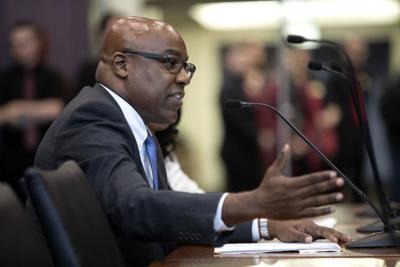URBANA — The University of Illinois System joined a lawsuit filed Monday by Illinois Attorney General Kwame Raoul and 17 other state’s attorney generals challenging new visa rules for international students.
The university also filed a legal brief Sunday in support of a lawsuit from Harvard and MIT challenging rules issued last week by the U.S. Immigration and Customs Agency that wouldn’t allow international students to take an exclusively online course load this semester.
“We will continue to do all we can to support our international students and those around the country during this difficult time,” President Tim Killeen wrote in a mass email Monday.
While the UI’s hybrid approach to the fall semester with both online and in-person instruction should limit the impact of the new rules, Killeen said, “we nonetheless believe the restrictions will be harmful to students elsewhere and to higher education in general.”
He said 13,500 UI students have F-1 visas that would be impacted by the ICE rules if the UI had to move classes entirely online, including 9,900 at the Urbana campus.
“If students are expelled from the U.S. as a result of the Rule, they may be forced to find a way to return to their home countries in the face of limited flight availability, grave risk of infection during travel and other risks,” Killeen wrote.
“Should they arrive home safely, continuation of their academic pursuits, if even possible, could be accompanied by unprecedented and unnecessary challenges such as attending online classes in the middle of the night, variable or unreliable technology, financial hardship and, for some students, the threat of government censorship, civil strife and other hazards.”
The Urbana campus also has more than 1,600 incoming international graduate students that will require a visa; more than 1,300 new undergraduates and about 670 new graduate students who attended high school in the U.S. and stayed here during the pandemic; and more than 1,100 new undergraduates from outside the U.S.
“At UIUC, international students account for $236 million in tuition, roughly 31 percent of the total tuition received,” Killeen wrote.
International students make up 21 percent of the Urbana campus’s enrollment, and if none could attend, it could lose more than $9.2 million in university housing and $24 million in fees, Killeen wrote.
“If international students were to leave, it would result in the loss of approximately $18.9 million in (financial) aid, the bulk of which goes to state of Illinois residents,” he wrote.
And besides the fiscal impact, Killeen said losing international students could lead to job losses, hurt research projects and diminish the UI’s “promise that students will experience a truly global education.”
And he said the UI doesn’t have the resources to react to the sudden move to restrict international students.
“Our Universities do not have adequate personnel and resources to individually review and certify the compliance of every one of our international students,” Killeen wrote.
If international students had to return home, their F-1 visas would be terminated and if they returned, they would need to spend two semesters in F-1 status before they would be authorized to work in the U.S.
“This abrupt shift would be a bitter shame and would be devastating to students who are close to degree completion and who face time restrictions related to their academic progress,” Killeen wrote.












